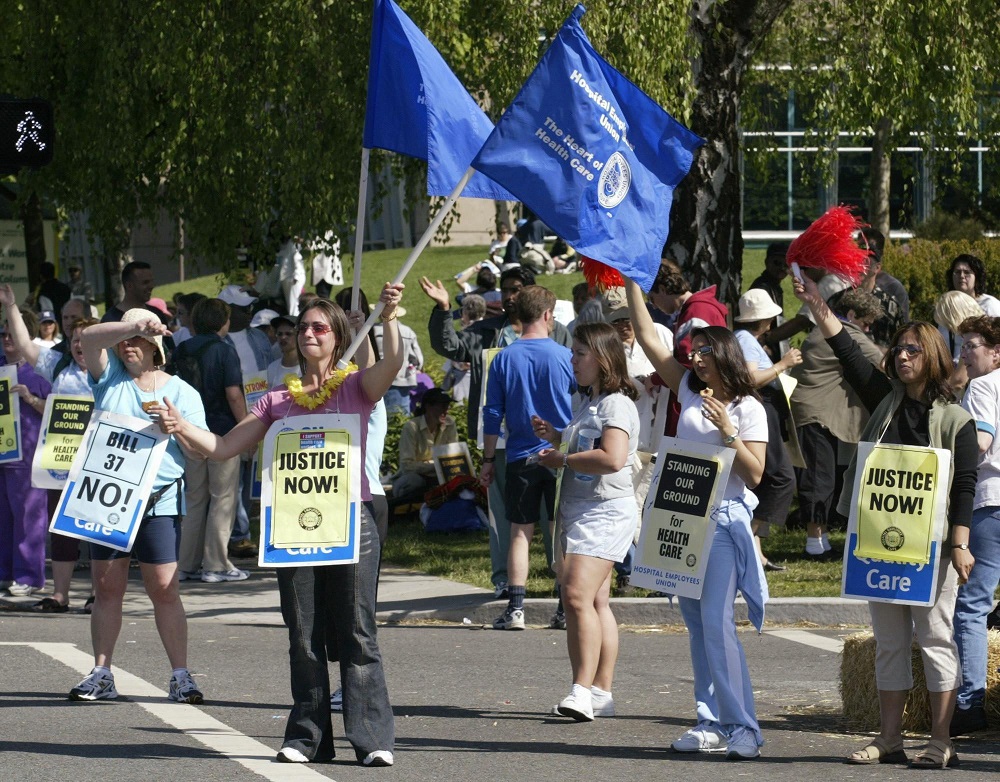Catalina Samson remembers the day the pink slip came and nearly half her salary disappeared.
Samson was working in food services at Vancouver General Hospital and holding down a second job at a long-term care home. Her pay, under a union contract, was just above $18 an hour. The Filipina immigrant had plans to own a home and was saving for retirement.
But the new BC Liberal government, elected in 2001, passed a law that ripped up union agreements, including protection against contracting out.
In 2002, Samson’s two health-care jobs were contracted out to private companies and she lost the benefits of the contracts her union had negotiated. Her wage dropped from $18.10 to $10.15 — just enough to survive.
“Your dream of having a roof, your dream of having a good retirement… it was gone,” Samson said.
Today, the legislation that outsourced Samson’s job have been reversed. She is one of thousands of health-care workers getting better wages and benefits.
In 2018, the NDP government repealed the BC Liberal legislation that aimed to cut costs in non-clinical health-care delivery — cleaning, food services, support workers — by contracting out jobs to companies. They generally operated without unions. If employees unionized, the company could give up the contract and a new provider would be hired.
Since then, roughly 5,000 workers are once again directly employed by the government and health authorities.
For some, it is a bittersweet victory in a 16-year battle that transformed B.C.’s labour movement, reset Canada’s labour laws and changed the lives of thousands of working people.
“We have a better voice. We feel like we are in-house,” said Judy Gicho, a care aide and housekeeper at Surrey Hospital’s critical care tower. “We are where we belong.”
Twenty years ago, a Hospital Employees’ Union member like Gicho could expect to make around $18 an hour under their collective agreement, equivalent to more than $30 an hour today.
That changed in 2002, when the newly elected BC Liberal government introduced Bills 29 and 94. The two laws made it far easier for government to pay third-party businesses to deliver non-clinical services in hospitals and facilities like care homes and stripped unionized workers of protections negotiated in their collective agreements.
The provincial government framed this as a way of reducing burgeoning costs in health care.
For the Hospital Employees’ Union, it was all but a declaration of war, especially as the BC Liberals had explicitly promised not to rip up contracts before the election.
More than 8,000 union workers were estimated to have lost their jobs in the immediate years after, including staff in long-term care, laundry services and housekeeping.
Some never got those jobs back; others were offered positions with third-party companies that came in to fill the gap, including French service provider Sodexo, which took over management of Samson’s job at Vancouver General Hospital.
“We had never seen anything like it anywhere in the country,” said Judy Darcy, a former NDP MLA who was the national president of CUPE at the time. She had her fair share of fights with governments, from Ralph Klein in Alberta to Bill Davis in Ontario.
But B.C.’s actions sent shockwaves through the country, Darcy said.
“It was truly terrifying that with one fell swoop, the government could just eliminate rights in such a fundamental area. And they did it with a lot of precision. The changes they made changed the labour code just for health-care workers,” Darcy said.
The HEU’s members are overwhelmingly women. Many, like Samson, are newcomers and people of colour. Meena Brisard, the HEU’s secretary-business manager, says her own aunties, uncles and neighbours in the South Asian community had their lives transformed.
“These were family supporting jobs that were taken away from them and turned into precarious work overnight,” Brisard said.
At the time, HEU received an outpouring of public support. Darcy joined the organization as secretary-treasurer in 2005. “I knew it was going to be a really, really tough uphill battle, and it was going to go on for years,” Darcy said.
The union began furiously working to reorganize the workers who had been laid off. Samson remembers covert efforts to get information to employees, many of them recent immigrants. That led to a strike at VGH, Samson said, that lasted nearly two months.
“We survived for 52 days, but me, I almost cried,” she said. They won back a modest boost in pay — up to just over $12 an hour, but still no pension.
Elsewhere, though, the union’s efforts were frustrated by “contract-flipping” — a practice where public health providers would simply hire another, non-union company if workers decided to form a union. That made unionizing a workplace a bit like whack-a-mole.
“When we would go and organize and negotiate a contract, they would flip it again to a new employer, then we had to go out and organize and bargain again. This went on for a decade and a half,” Brisard said.
That led to a landmark legal victory in 2007 when Canada’s Supreme Court threw out parts of Bill 29, ruling it violated workers’ protections under the Charter of Rights and Freedoms.
Darcy remembers the union’s lawyer telling them the news over the phone. “We just whooped. We absolutely whooped,” Darcy said. Yells of joy broke out through HEU’s headquarters as word spread. “It was just an indescribability joyful moment. And as the word spread in the building, it was like everybody was literally jumping for joy.”
As a result, the BC Liberal government of the day paid out about $84 million to health-care workers affected by the bill. Then-health minister George Abbott defended the legislation and its stated mission of cutting unnecessary costs in the province’s health-care system.
That Supreme Court decision created a national precedent that collective bargaining rights are protected by the country’s charter. That principle rose to the fore again this year, after the Ontario government’s attempt to impose a contract on education workers in that province. That legislation has since been withdrawn.
It would take a new government to bring the fight to a close. In 2018, the newly elected BC NDP repealed both bills. As of this October, the HEU estimated 4,965 workers had returned “in-house” with various health authorities.
For most, this meant an instant raise. The union says most privatized food service workers, for example, were making about $17 an hour and will make closer to $22 once their transfer is complete.
But the damage — and legacy — of Bill 29 persists to this day.
Marjorie Griffin Cohen, a feminist economic and professor emeritus at Simon Fraser University, notes workers like Samson are still being paid less than if the legislation ripping up their contracts hadn’t been passed.
“They haven’t made up, and they’re nowhere near dealing with the cost of living increases that have happened during that time,” Cohen said. She believes that is partially why B.C. continues to have one of the largest gender gaps for wages in Canada. She argues the intense battle over the bill also shook the labour movement itself.
“Labour really suffered in B.C. and it hasn’t recovered yet. It hasn’t recovered all that it lost. And it hasn’t recovered its courage,” Cohen said.
The reduced employee rights enabled by the laws worsened the toll the COVID-19 pandemic took on health-care workers, advocates say.
In long-term care, for example, B.C. had to introduce legislation increasing pay in all facilities to the union rate so workers at other homes would not be forced to work multiple jobs.
Gicho said the fear of contracting the virus was so great in her workplace that some workers voluntarily segregated themselves from their own families.
“It was tough. We were frustrated. We were scared. And it was like, when is this going to end?” Gicho said.
The battle also isn’t over.
Thousands of long-term care workers who would have been directly employed by the health authority are still contracted by third-party companies. Many are union members, but don't enjoy the same benefits they would if they were directly employed by health authorities.
Brisard confirmed HEU is exploring “a number of legal avenues” to reorganize workers in long-term care but declined to provide specifics.
And there are still many workers at hospital facilities managed under public-private partnership or P3 contracts who have yet to be brought back in house. Workers at P3 facilities in the Fraser Health authority will gradually begin returning in-house over the next few years as part of a collective agreement struck between unions and the government. But the timeline for other workers is uncertain.
None of that has diminished the relief many workers feel. At the HEU’s annual convention, many wept.
Labour Minister Harry Bains has joined some Sikh workers in gurdwaras, where they gave thanks for their return. “The first event I went to on Vancouver Island, a South Asian woman in her late 40s came up and she thanked me. She said she can now quit my second job at a restaurant,” Brisard said.
Samson will not get to reap all the benefits of the battle she helped win. At 67, she is still working, trying to save up for retirement after 18 years without the benefit of a pension plan.
Her hope is that the work benefits those who come after.
“It’s not for us anymore. Pretty soon we cannot tolerate the job anymore. It’s getting tougher for us,” Samson said. “But it’s for the young ones.” ![]()
Read more: Labour + Industry, BC Politics

















Tyee Commenting Guidelines
Comments that violate guidelines risk being deleted, and violations may result in a temporary or permanent user ban. Maintain the spirit of good conversation to stay in the discussion.
*Please note The Tyee is not a forum for spreading misinformation about COVID-19, denying its existence or minimizing its risk to public health.
Do:
Do not: